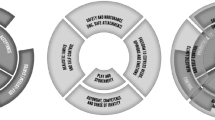Abstract
Schema Therapy combines cognitive theory and developmental concepts. The impact of early childhood need frustrations leads to biased cognitive schemata. The focus on aversive early childhood experiences and resulting schemas broadens the scope of conventional cognitive case formulations into the very early childhood years. The experiential interventions used in Schema Therapy add an emotional dimension to the initial cognitive framework, by bringing the clients in touch with significant childhood experiences. The Contextual Schema Therapy approach tries to further develop Schema Therapy by using the Acceptance and Commitment Therapy (ACT) processes to describe in detail, how the clients in their adaptive modes relate to schema activations and the resulting modes. For all these reasons, Schema Therapy is a kind of hybrid in dealing with the case formulation, combining aware executive management and experiential development.
Access this chapter
Tax calculation will be finalised at checkout
Purchases are for personal use only
Similar content being viewed by others
References
Arntz, A. (2012). Imagery rescripting as a therapeutic technique: Review of clinical trials, basic studies, and research agenda. Journal of Experimental Psychopathology, 3, 189–208.
Bowlby, J. (1969). Attachment. Attachment and loss: Vol. 1. Loss. New York, NY: Basic Books.
Guidano, V. F., & Liotti, G. (1983). Cognitive processes and emotional disorder: A structural approach to psychotherapy. New York, NY: Guilford Press.
Kelly, G. A. (1955). The psychology of personal constructs. New York, NY: Norton.
Roediger, E., Stevens, B., & Brockman, R. (2018). Contextual schema therapy: An integrative approach to personality disorders, emotional dysregulation, and interpersonal functioning. Oakland, CA: New Harbinger.
Author information
Authors and Affiliations
Corresponding author
Editor information
Editors and Affiliations
Rights and permissions
Copyright information
© 2021 Springer Nature Switzerland AG
About this chapter
Cite this chapter
Roediger, E., Melli, G., Marsigli, N. (2021). Schema Therapy, Contextual Schema Therapy and Case Formulation: Commentary on Chapter “Case Formulation in Process-Based Therapies”. In: Ruggiero, G.M., Caselli, G., Sassaroli, S. (eds) CBT Case Formulation as Therapeutic Process. Springer, Cham. https://doi.org/10.1007/978-3-030-63587-9_14
Download citation
DOI: https://doi.org/10.1007/978-3-030-63587-9_14
Published:
Publisher Name: Springer, Cham
Print ISBN: 978-3-030-63586-2
Online ISBN: 978-3-030-63587-9
eBook Packages: Behavioral Science and PsychologyBehavioral Science and Psychology (R0)




